Comprehensive Report: Leadership, Management, and Operations at M&S
VerifiedAdded on 2020/06/04
|12
|3526
|118
Report
AI Summary
This report provides a comprehensive analysis of leadership, management, and operational strategies within M&S, a prominent retail sector company. The report begins by contrasting the roles of leaders and managers, emphasizing their significance in guiding organizational goals and motivating employees. It discusses the characteristics of managers, who focus on task delegation and resource allocation, and leaders, who inspire and maintain employee morale. The report then delves into the practical application of leadership and management in various situations, highlighting the importance of motivation, conflict resolution, and maintaining quality standards. Furthermore, it explores different leadership theories and models, including situational leadership, system leadership, and contingency theory, explaining their application in different organizational contexts. The report also examines operations management, covering theories like Six Sigma, TQM, lean production, and queuing theory, demonstrating how these approaches contribute to efficiency, quality, and customer satisfaction within M&S. The report concludes by emphasizing the critical role of leaders and managers in making effective decisions within the organization.
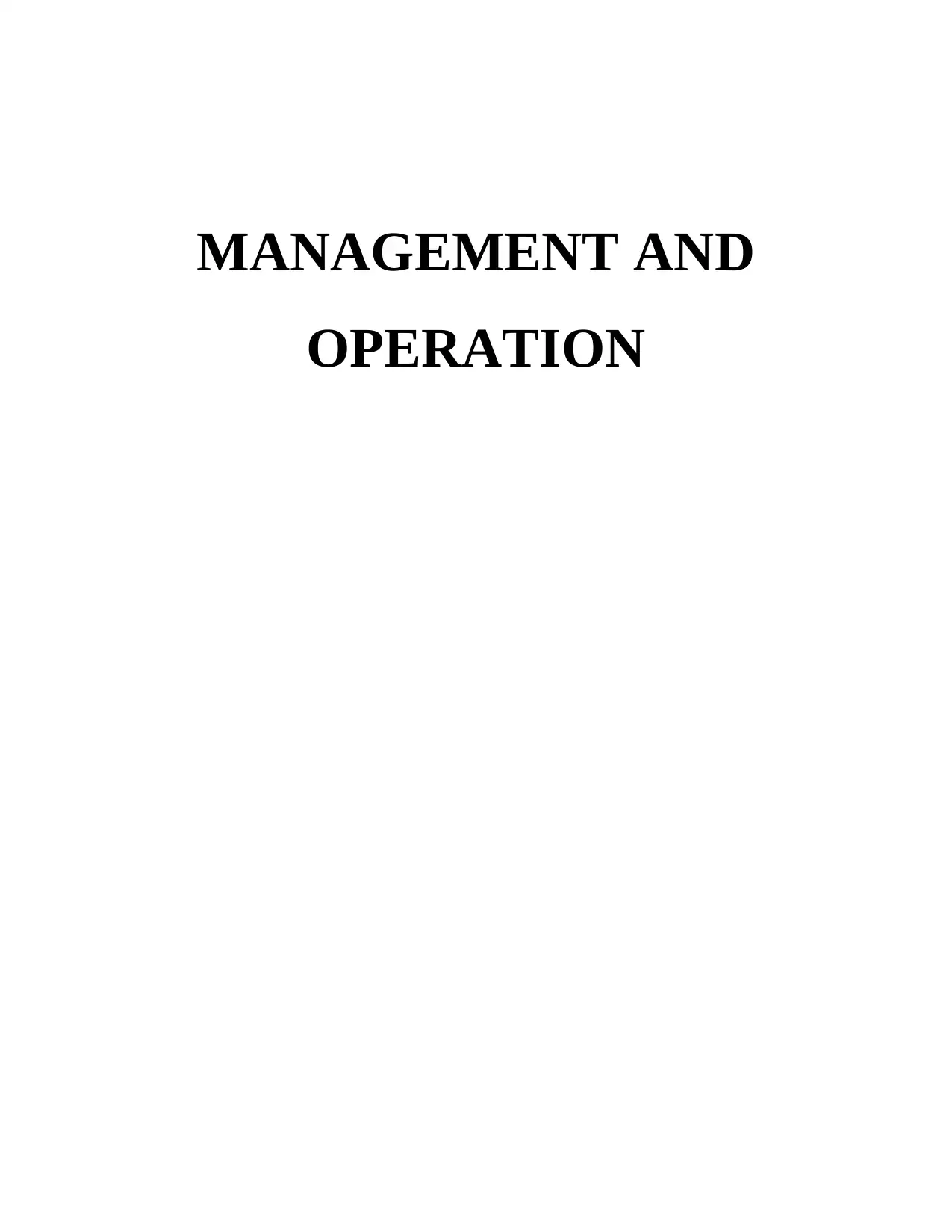
MANAGEMENT AND
OPERATION
OPERATION
Paraphrase This Document
Need a fresh take? Get an instant paraphrase of this document with our AI Paraphraser
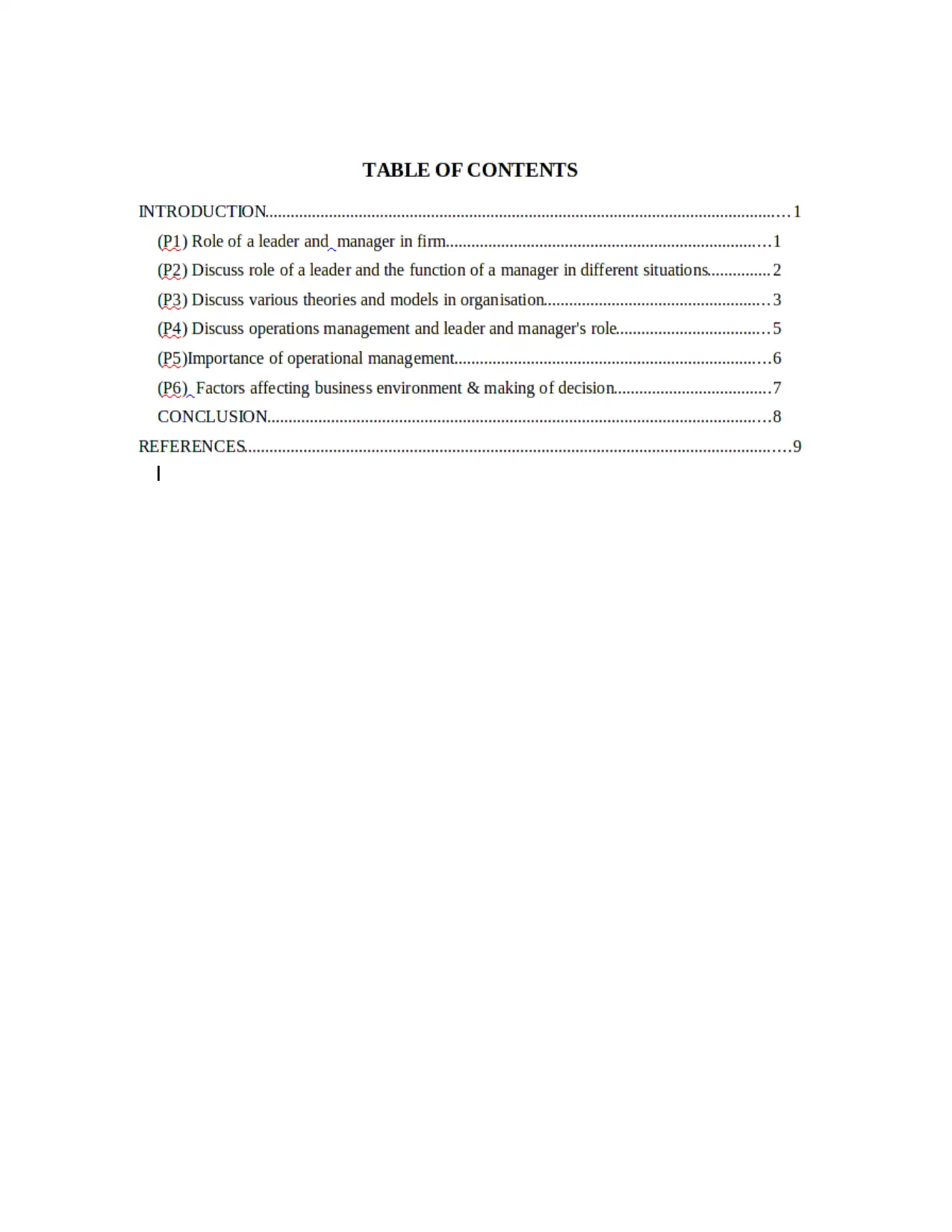
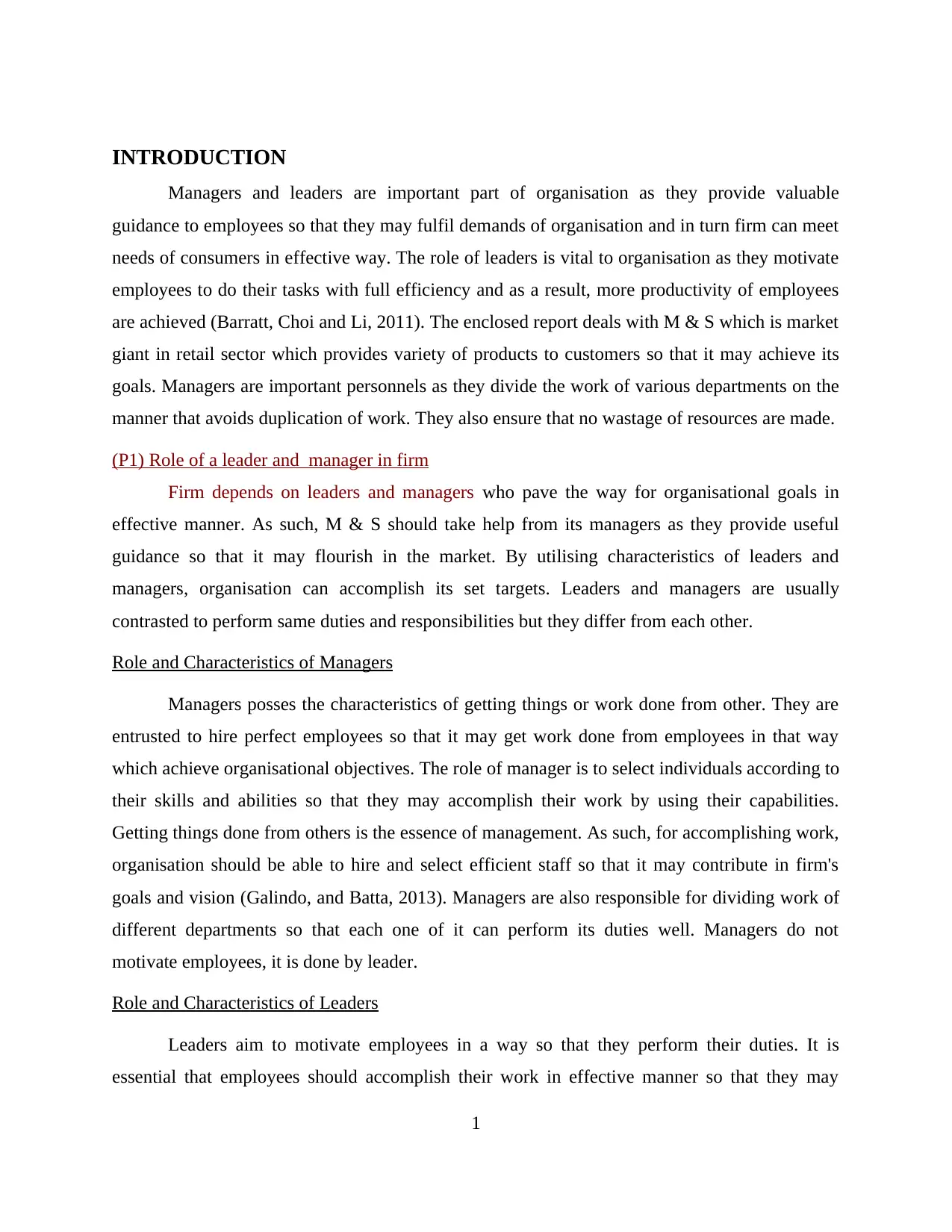
INTRODUCTION
Managers and leaders are important part of organisation as they provide valuable
guidance to employees so that they may fulfil demands of organisation and in turn firm can meet
needs of consumers in effective way. The role of leaders is vital to organisation as they motivate
employees to do their tasks with full efficiency and as a result, more productivity of employees
are achieved (Barratt, Choi and Li, 2011). The enclosed report deals with M & S which is market
giant in retail sector which provides variety of products to customers so that it may achieve its
goals. Managers are important personnels as they divide the work of various departments on the
manner that avoids duplication of work. They also ensure that no wastage of resources are made.
(P1) Role of a leader and manager in firm
Firm depends on leaders and managers who pave the way for organisational goals in
effective manner. As such, M & S should take help from its managers as they provide useful
guidance so that it may flourish in the market. By utilising characteristics of leaders and
managers, organisation can accomplish its set targets. Leaders and managers are usually
contrasted to perform same duties and responsibilities but they differ from each other.
Role and Characteristics of Managers
Managers posses the characteristics of getting things or work done from other. They are
entrusted to hire perfect employees so that it may get work done from employees in that way
which achieve organisational objectives. The role of manager is to select individuals according to
their skills and abilities so that they may accomplish their work by using their capabilities.
Getting things done from others is the essence of management. As such, for accomplishing work,
organisation should be able to hire and select efficient staff so that it may contribute in firm's
goals and vision (Galindo, and Batta, 2013). Managers are also responsible for dividing work of
different departments so that each one of it can perform its duties well. Managers do not
motivate employees, it is done by leader.
Role and Characteristics of Leaders
Leaders aim to motivate employees in a way so that they perform their duties. It is
essential that employees should accomplish their work in effective manner so that they may
1
Managers and leaders are important part of organisation as they provide valuable
guidance to employees so that they may fulfil demands of organisation and in turn firm can meet
needs of consumers in effective way. The role of leaders is vital to organisation as they motivate
employees to do their tasks with full efficiency and as a result, more productivity of employees
are achieved (Barratt, Choi and Li, 2011). The enclosed report deals with M & S which is market
giant in retail sector which provides variety of products to customers so that it may achieve its
goals. Managers are important personnels as they divide the work of various departments on the
manner that avoids duplication of work. They also ensure that no wastage of resources are made.
(P1) Role of a leader and manager in firm
Firm depends on leaders and managers who pave the way for organisational goals in
effective manner. As such, M & S should take help from its managers as they provide useful
guidance so that it may flourish in the market. By utilising characteristics of leaders and
managers, organisation can accomplish its set targets. Leaders and managers are usually
contrasted to perform same duties and responsibilities but they differ from each other.
Role and Characteristics of Managers
Managers posses the characteristics of getting things or work done from other. They are
entrusted to hire perfect employees so that it may get work done from employees in that way
which achieve organisational objectives. The role of manager is to select individuals according to
their skills and abilities so that they may accomplish their work by using their capabilities.
Getting things done from others is the essence of management. As such, for accomplishing work,
organisation should be able to hire and select efficient staff so that it may contribute in firm's
goals and vision (Galindo, and Batta, 2013). Managers are also responsible for dividing work of
different departments so that each one of it can perform its duties well. Managers do not
motivate employees, it is done by leader.
Role and Characteristics of Leaders
Leaders aim to motivate employees in a way so that they perform their duties. It is
essential that employees should accomplish their work in effective manner so that they may
1
⊘ This is a preview!⊘
Do you want full access?
Subscribe today to unlock all pages.

Trusted by 1+ million students worldwide
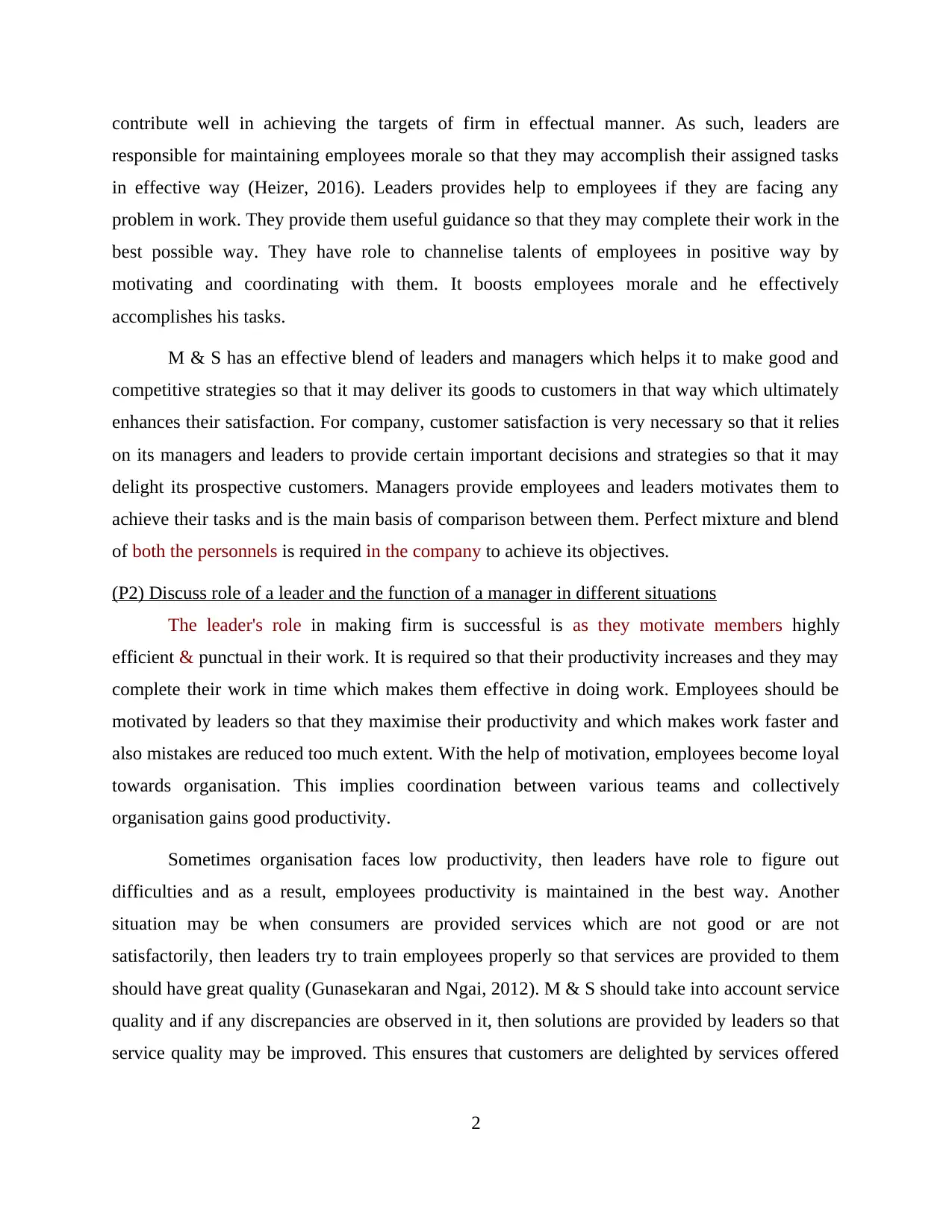
contribute well in achieving the targets of firm in effectual manner. As such, leaders are
responsible for maintaining employees morale so that they may accomplish their assigned tasks
in effective way (Heizer, 2016). Leaders provides help to employees if they are facing any
problem in work. They provide them useful guidance so that they may complete their work in the
best possible way. They have role to channelise talents of employees in positive way by
motivating and coordinating with them. It boosts employees morale and he effectively
accomplishes his tasks.
M & S has an effective blend of leaders and managers which helps it to make good and
competitive strategies so that it may deliver its goods to customers in that way which ultimately
enhances their satisfaction. For company, customer satisfaction is very necessary so that it relies
on its managers and leaders to provide certain important decisions and strategies so that it may
delight its prospective customers. Managers provide employees and leaders motivates them to
achieve their tasks and is the main basis of comparison between them. Perfect mixture and blend
of both the personnels is required in the company to achieve its objectives.
(P2) Discuss role of a leader and the function of a manager in different situations
The leader's role in making firm is successful is as they motivate members highly
efficient & punctual in their work. It is required so that their productivity increases and they may
complete their work in time which makes them effective in doing work. Employees should be
motivated by leaders so that they maximise their productivity and which makes work faster and
also mistakes are reduced too much extent. With the help of motivation, employees become loyal
towards organisation. This implies coordination between various teams and collectively
organisation gains good productivity.
Sometimes organisation faces low productivity, then leaders have role to figure out
difficulties and as a result, employees productivity is maintained in the best way. Another
situation may be when consumers are provided services which are not good or are not
satisfactorily, then leaders try to train employees properly so that services are provided to them
should have great quality (Gunasekaran and Ngai, 2012). M & S should take into account service
quality and if any discrepancies are observed in it, then solutions are provided by leaders so that
service quality may be improved. This ensures that customers are delighted by services offered
2
responsible for maintaining employees morale so that they may accomplish their assigned tasks
in effective way (Heizer, 2016). Leaders provides help to employees if they are facing any
problem in work. They provide them useful guidance so that they may complete their work in the
best possible way. They have role to channelise talents of employees in positive way by
motivating and coordinating with them. It boosts employees morale and he effectively
accomplishes his tasks.
M & S has an effective blend of leaders and managers which helps it to make good and
competitive strategies so that it may deliver its goods to customers in that way which ultimately
enhances their satisfaction. For company, customer satisfaction is very necessary so that it relies
on its managers and leaders to provide certain important decisions and strategies so that it may
delight its prospective customers. Managers provide employees and leaders motivates them to
achieve their tasks and is the main basis of comparison between them. Perfect mixture and blend
of both the personnels is required in the company to achieve its objectives.
(P2) Discuss role of a leader and the function of a manager in different situations
The leader's role in making firm is successful is as they motivate members highly
efficient & punctual in their work. It is required so that their productivity increases and they may
complete their work in time which makes them effective in doing work. Employees should be
motivated by leaders so that they maximise their productivity and which makes work faster and
also mistakes are reduced too much extent. With the help of motivation, employees become loyal
towards organisation. This implies coordination between various teams and collectively
organisation gains good productivity.
Sometimes organisation faces low productivity, then leaders have role to figure out
difficulties and as a result, employees productivity is maintained in the best way. Another
situation may be when consumers are provided services which are not good or are not
satisfactorily, then leaders try to train employees properly so that services are provided to them
should have great quality (Gunasekaran and Ngai, 2012). M & S should take into account service
quality and if any discrepancies are observed in it, then solutions are provided by leaders so that
service quality may be improved. This ensures that customers are delighted by services offered
2
Paraphrase This Document
Need a fresh take? Get an instant paraphrase of this document with our AI Paraphraser
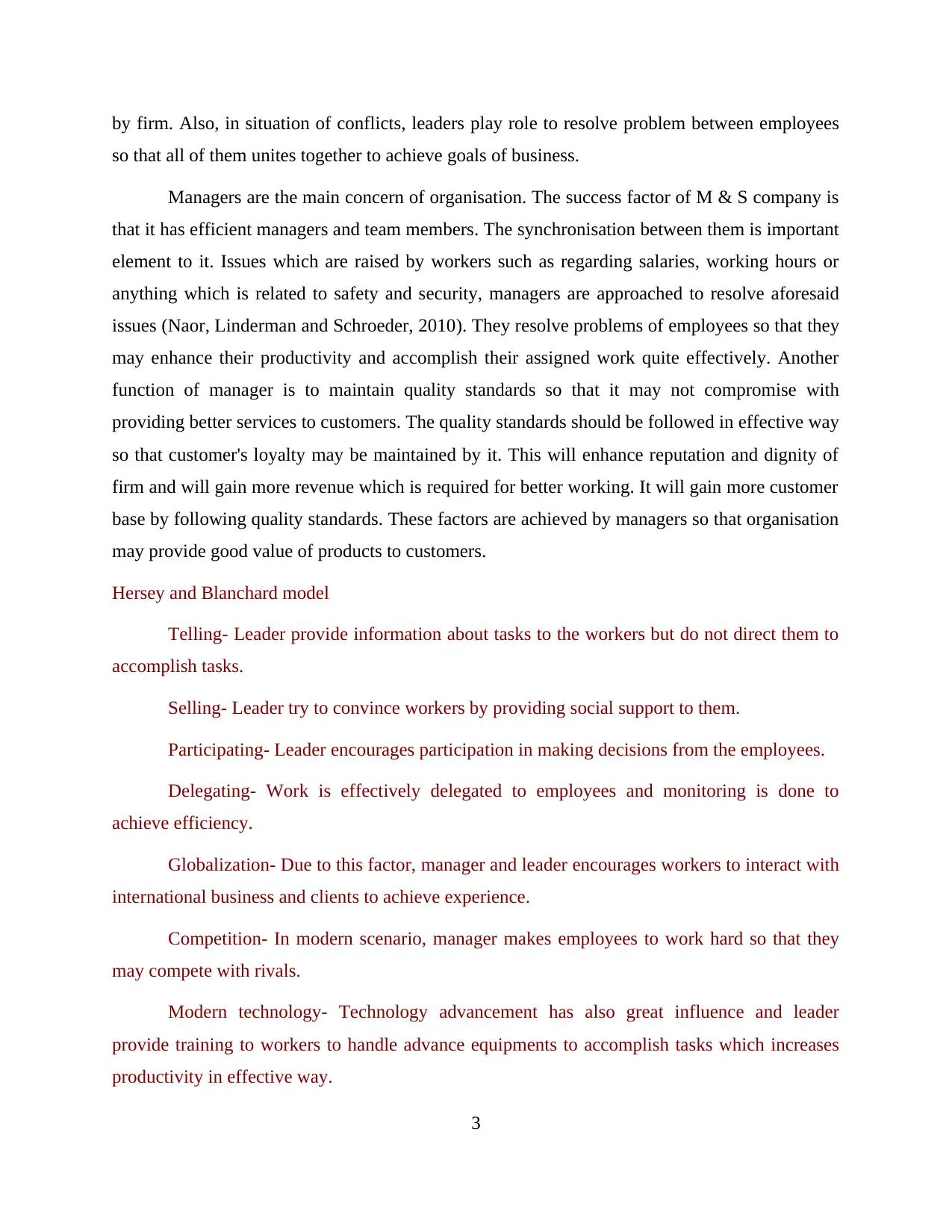
by firm. Also, in situation of conflicts, leaders play role to resolve problem between employees
so that all of them unites together to achieve goals of business.
Managers are the main concern of organisation. The success factor of M & S company is
that it has efficient managers and team members. The synchronisation between them is important
element to it. Issues which are raised by workers such as regarding salaries, working hours or
anything which is related to safety and security, managers are approached to resolve aforesaid
issues (Naor, Linderman and Schroeder, 2010). They resolve problems of employees so that they
may enhance their productivity and accomplish their assigned work quite effectively. Another
function of manager is to maintain quality standards so that it may not compromise with
providing better services to customers. The quality standards should be followed in effective way
so that customer's loyalty may be maintained by it. This will enhance reputation and dignity of
firm and will gain more revenue which is required for better working. It will gain more customer
base by following quality standards. These factors are achieved by managers so that organisation
may provide good value of products to customers.
Hersey and Blanchard model
Telling- Leader provide information about tasks to the workers but do not direct them to
accomplish tasks.
Selling- Leader try to convince workers by providing social support to them.
Participating- Leader encourages participation in making decisions from the employees.
Delegating- Work is effectively delegated to employees and monitoring is done to
achieve efficiency.
Globalization- Due to this factor, manager and leader encourages workers to interact with
international business and clients to achieve experience.
Competition- In modern scenario, manager makes employees to work hard so that they
may compete with rivals.
Modern technology- Technology advancement has also great influence and leader
provide training to workers to handle advance equipments to accomplish tasks which increases
productivity in effective way.
3
so that all of them unites together to achieve goals of business.
Managers are the main concern of organisation. The success factor of M & S company is
that it has efficient managers and team members. The synchronisation between them is important
element to it. Issues which are raised by workers such as regarding salaries, working hours or
anything which is related to safety and security, managers are approached to resolve aforesaid
issues (Naor, Linderman and Schroeder, 2010). They resolve problems of employees so that they
may enhance their productivity and accomplish their assigned work quite effectively. Another
function of manager is to maintain quality standards so that it may not compromise with
providing better services to customers. The quality standards should be followed in effective way
so that customer's loyalty may be maintained by it. This will enhance reputation and dignity of
firm and will gain more revenue which is required for better working. It will gain more customer
base by following quality standards. These factors are achieved by managers so that organisation
may provide good value of products to customers.
Hersey and Blanchard model
Telling- Leader provide information about tasks to the workers but do not direct them to
accomplish tasks.
Selling- Leader try to convince workers by providing social support to them.
Participating- Leader encourages participation in making decisions from the employees.
Delegating- Work is effectively delegated to employees and monitoring is done to
achieve efficiency.
Globalization- Due to this factor, manager and leader encourages workers to interact with
international business and clients to achieve experience.
Competition- In modern scenario, manager makes employees to work hard so that they
may compete with rivals.
Modern technology- Technology advancement has also great influence and leader
provide training to workers to handle advance equipments to accomplish tasks which increases
productivity in effective way.
3
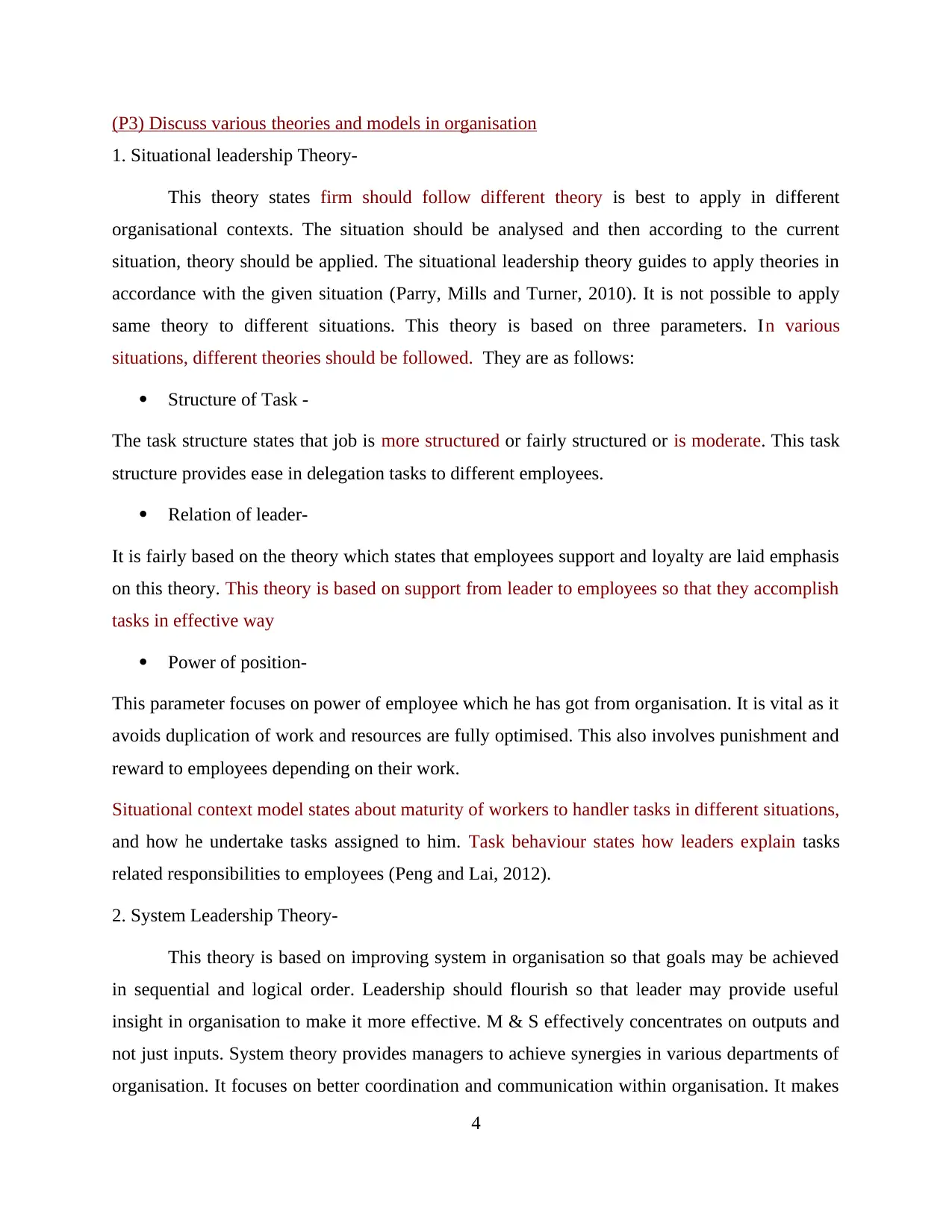
(P3) Discuss various theories and models in organisation
1. Situational leadership Theory-
This theory states firm should follow different theory is best to apply in different
organisational contexts. The situation should be analysed and then according to the current
situation, theory should be applied. The situational leadership theory guides to apply theories in
accordance with the given situation (Parry, Mills and Turner, 2010). It is not possible to apply
same theory to different situations. This theory is based on three parameters. In various
situations, different theories should be followed. They are as follows:
Structure of Task -
The task structure states that job is more structured or fairly structured or is moderate. This task
structure provides ease in delegation tasks to different employees.
Relation of leader-
It is fairly based on the theory which states that employees support and loyalty are laid emphasis
on this theory. This theory is based on support from leader to employees so that they accomplish
tasks in effective way
Power of position-
This parameter focuses on power of employee which he has got from organisation. It is vital as it
avoids duplication of work and resources are fully optimised. This also involves punishment and
reward to employees depending on their work.
Situational context model states about maturity of workers to handler tasks in different situations,
and how he undertake tasks assigned to him. Task behaviour states how leaders explain tasks
related responsibilities to employees (Peng and Lai, 2012).
2. System Leadership Theory-
This theory is based on improving system in organisation so that goals may be achieved
in sequential and logical order. Leadership should flourish so that leader may provide useful
insight in organisation to make it more effective. M & S effectively concentrates on outputs and
not just inputs. System theory provides managers to achieve synergies in various departments of
organisation. It focuses on better coordination and communication within organisation. It makes
4
1. Situational leadership Theory-
This theory states firm should follow different theory is best to apply in different
organisational contexts. The situation should be analysed and then according to the current
situation, theory should be applied. The situational leadership theory guides to apply theories in
accordance with the given situation (Parry, Mills and Turner, 2010). It is not possible to apply
same theory to different situations. This theory is based on three parameters. In various
situations, different theories should be followed. They are as follows:
Structure of Task -
The task structure states that job is more structured or fairly structured or is moderate. This task
structure provides ease in delegation tasks to different employees.
Relation of leader-
It is fairly based on the theory which states that employees support and loyalty are laid emphasis
on this theory. This theory is based on support from leader to employees so that they accomplish
tasks in effective way
Power of position-
This parameter focuses on power of employee which he has got from organisation. It is vital as it
avoids duplication of work and resources are fully optimised. This also involves punishment and
reward to employees depending on their work.
Situational context model states about maturity of workers to handler tasks in different situations,
and how he undertake tasks assigned to him. Task behaviour states how leaders explain tasks
related responsibilities to employees (Peng and Lai, 2012).
2. System Leadership Theory-
This theory is based on improving system in organisation so that goals may be achieved
in sequential and logical order. Leadership should flourish so that leader may provide useful
insight in organisation to make it more effective. M & S effectively concentrates on outputs and
not just inputs. System theory provides managers to achieve synergies in various departments of
organisation. It focuses on better coordination and communication within organisation. It makes
4
⊘ This is a preview!⊘
Do you want full access?
Subscribe today to unlock all pages.

Trusted by 1+ million students worldwide
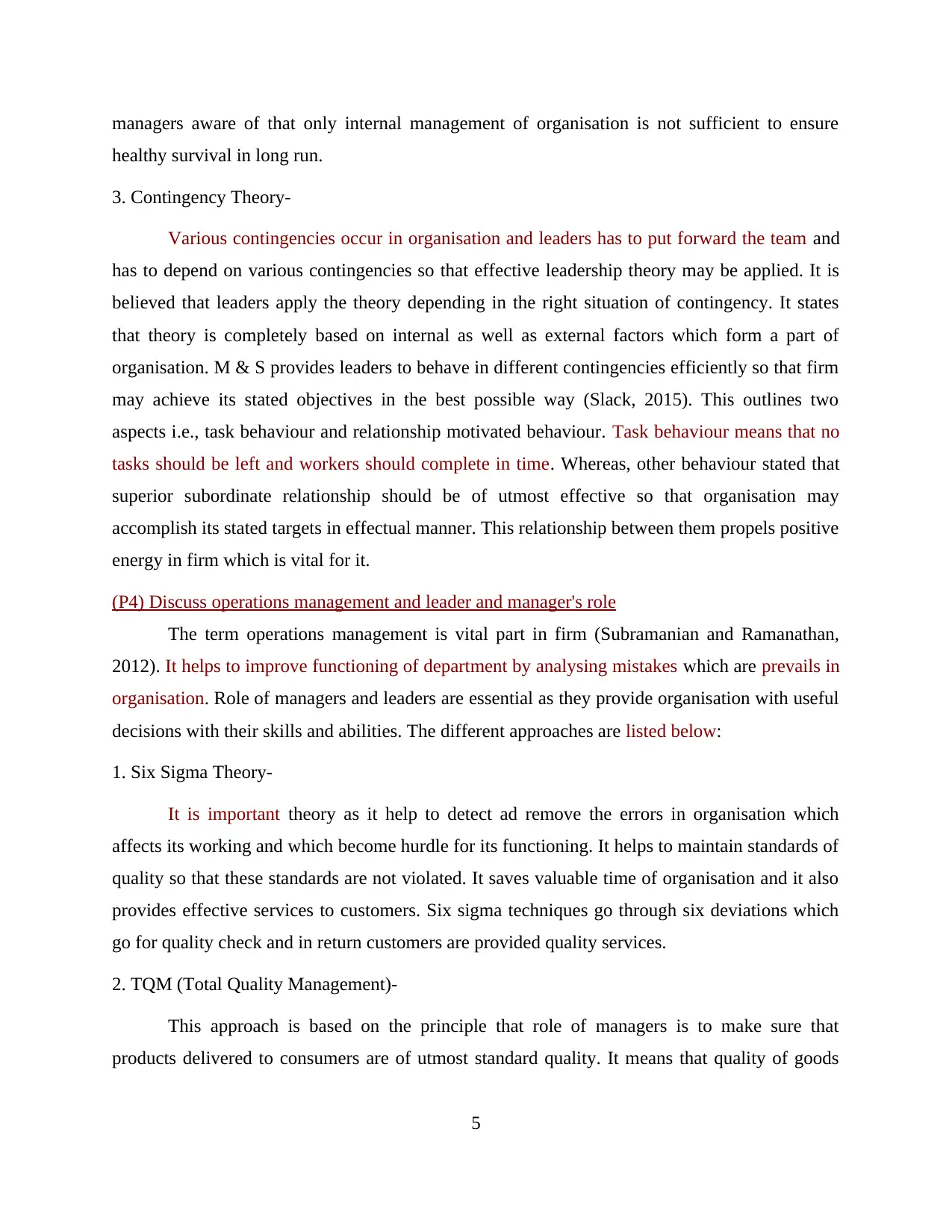
managers aware of that only internal management of organisation is not sufficient to ensure
healthy survival in long run.
3. Contingency Theory-
Various contingencies occur in organisation and leaders has to put forward the team and
has to depend on various contingencies so that effective leadership theory may be applied. It is
believed that leaders apply the theory depending in the right situation of contingency. It states
that theory is completely based on internal as well as external factors which form a part of
organisation. M & S provides leaders to behave in different contingencies efficiently so that firm
may achieve its stated objectives in the best possible way (Slack, 2015). This outlines two
aspects i.e., task behaviour and relationship motivated behaviour. Task behaviour means that no
tasks should be left and workers should complete in time. Whereas, other behaviour stated that
superior subordinate relationship should be of utmost effective so that organisation may
accomplish its stated targets in effectual manner. This relationship between them propels positive
energy in firm which is vital for it.
(P4) Discuss operations management and leader and manager's role
The term operations management is vital part in firm (Subramanian and Ramanathan,
2012). It helps to improve functioning of department by analysing mistakes which are prevails in
organisation. Role of managers and leaders are essential as they provide organisation with useful
decisions with their skills and abilities. The different approaches are listed below:
1. Six Sigma Theory-
It is important theory as it help to detect ad remove the errors in organisation which
affects its working and which become hurdle for its functioning. It helps to maintain standards of
quality so that these standards are not violated. It saves valuable time of organisation and it also
provides effective services to customers. Six sigma techniques go through six deviations which
go for quality check and in return customers are provided quality services.
2. TQM (Total Quality Management)-
This approach is based on the principle that role of managers is to make sure that
products delivered to consumers are of utmost standard quality. It means that quality of goods
5
healthy survival in long run.
3. Contingency Theory-
Various contingencies occur in organisation and leaders has to put forward the team and
has to depend on various contingencies so that effective leadership theory may be applied. It is
believed that leaders apply the theory depending in the right situation of contingency. It states
that theory is completely based on internal as well as external factors which form a part of
organisation. M & S provides leaders to behave in different contingencies efficiently so that firm
may achieve its stated objectives in the best possible way (Slack, 2015). This outlines two
aspects i.e., task behaviour and relationship motivated behaviour. Task behaviour means that no
tasks should be left and workers should complete in time. Whereas, other behaviour stated that
superior subordinate relationship should be of utmost effective so that organisation may
accomplish its stated targets in effectual manner. This relationship between them propels positive
energy in firm which is vital for it.
(P4) Discuss operations management and leader and manager's role
The term operations management is vital part in firm (Subramanian and Ramanathan,
2012). It helps to improve functioning of department by analysing mistakes which are prevails in
organisation. Role of managers and leaders are essential as they provide organisation with useful
decisions with their skills and abilities. The different approaches are listed below:
1. Six Sigma Theory-
It is important theory as it help to detect ad remove the errors in organisation which
affects its working and which become hurdle for its functioning. It helps to maintain standards of
quality so that these standards are not violated. It saves valuable time of organisation and it also
provides effective services to customers. Six sigma techniques go through six deviations which
go for quality check and in return customers are provided quality services.
2. TQM (Total Quality Management)-
This approach is based on the principle that role of managers is to make sure that
products delivered to consumers are of utmost standard quality. It means that quality of goods
5
Paraphrase This Document
Need a fresh take? Get an instant paraphrase of this document with our AI Paraphraser
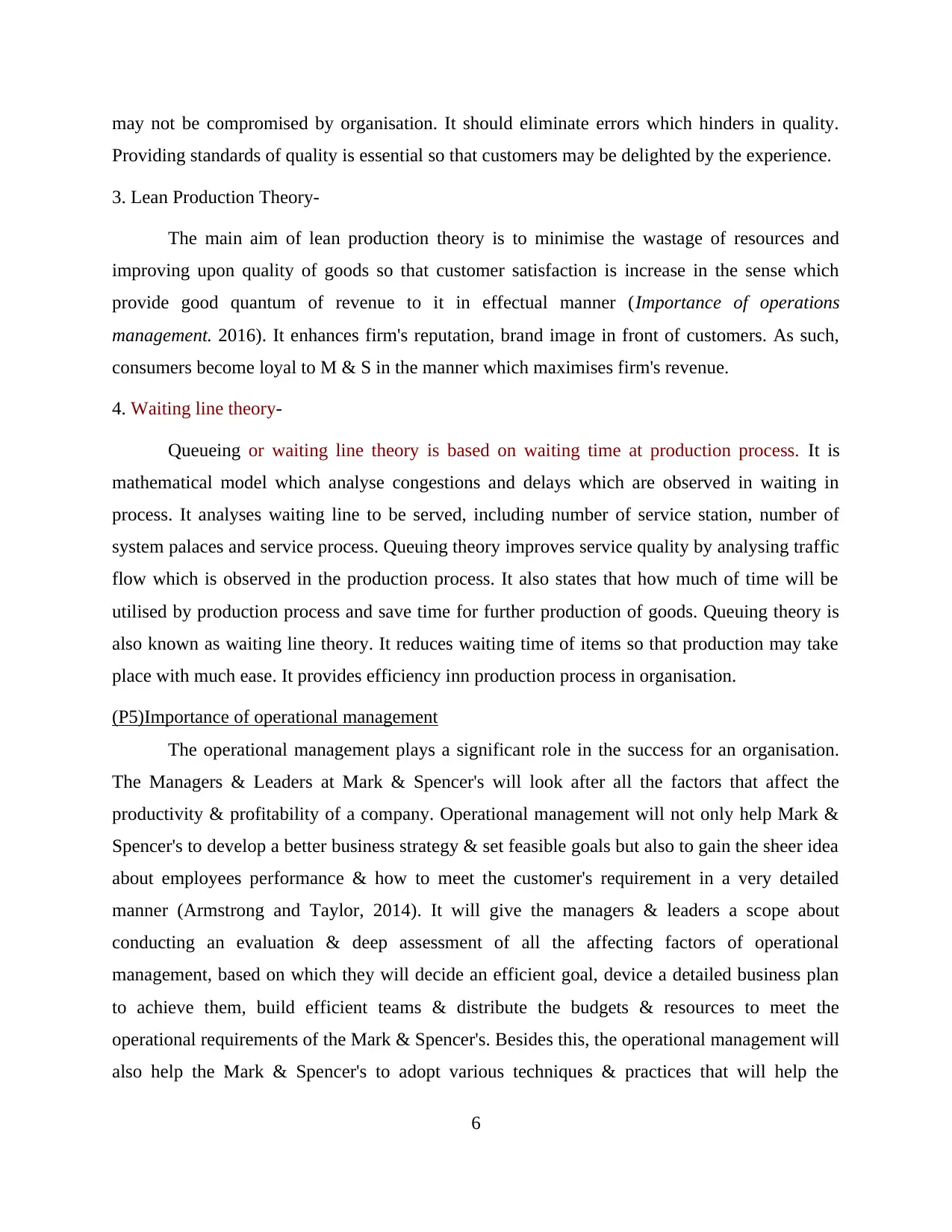
may not be compromised by organisation. It should eliminate errors which hinders in quality.
Providing standards of quality is essential so that customers may be delighted by the experience.
3. Lean Production Theory-
The main aim of lean production theory is to minimise the wastage of resources and
improving upon quality of goods so that customer satisfaction is increase in the sense which
provide good quantum of revenue to it in effectual manner (Importance of operations
management. 2016). It enhances firm's reputation, brand image in front of customers. As such,
consumers become loyal to M & S in the manner which maximises firm's revenue.
4. Waiting line theory-
Queueing or waiting line theory is based on waiting time at production process. It is
mathematical model which analyse congestions and delays which are observed in waiting in
process. It analyses waiting line to be served, including number of service station, number of
system palaces and service process. Queuing theory improves service quality by analysing traffic
flow which is observed in the production process. It also states that how much of time will be
utilised by production process and save time for further production of goods. Queuing theory is
also known as waiting line theory. It reduces waiting time of items so that production may take
place with much ease. It provides efficiency inn production process in organisation.
(P5)Importance of operational management
The operational management plays a significant role in the success for an organisation.
The Managers & Leaders at Mark & Spencer's will look after all the factors that affect the
productivity & profitability of a company. Operational management will not only help Mark &
Spencer's to develop a better business strategy & set feasible goals but also to gain the sheer idea
about employees performance & how to meet the customer's requirement in a very detailed
manner (Armstrong and Taylor, 2014). It will give the managers & leaders a scope about
conducting an evaluation & deep assessment of all the affecting factors of operational
management, based on which they will decide an efficient goal, device a detailed business plan
to achieve them, build efficient teams & distribute the budgets & resources to meet the
operational requirements of the Mark & Spencer's. Besides this, the operational management will
also help the Mark & Spencer's to adopt various techniques & practices that will help the
6
Providing standards of quality is essential so that customers may be delighted by the experience.
3. Lean Production Theory-
The main aim of lean production theory is to minimise the wastage of resources and
improving upon quality of goods so that customer satisfaction is increase in the sense which
provide good quantum of revenue to it in effectual manner (Importance of operations
management. 2016). It enhances firm's reputation, brand image in front of customers. As such,
consumers become loyal to M & S in the manner which maximises firm's revenue.
4. Waiting line theory-
Queueing or waiting line theory is based on waiting time at production process. It is
mathematical model which analyse congestions and delays which are observed in waiting in
process. It analyses waiting line to be served, including number of service station, number of
system palaces and service process. Queuing theory improves service quality by analysing traffic
flow which is observed in the production process. It also states that how much of time will be
utilised by production process and save time for further production of goods. Queuing theory is
also known as waiting line theory. It reduces waiting time of items so that production may take
place with much ease. It provides efficiency inn production process in organisation.
(P5)Importance of operational management
The operational management plays a significant role in the success for an organisation.
The Managers & Leaders at Mark & Spencer's will look after all the factors that affect the
productivity & profitability of a company. Operational management will not only help Mark &
Spencer's to develop a better business strategy & set feasible goals but also to gain the sheer idea
about employees performance & how to meet the customer's requirement in a very detailed
manner (Armstrong and Taylor, 2014). It will give the managers & leaders a scope about
conducting an evaluation & deep assessment of all the affecting factors of operational
management, based on which they will decide an efficient goal, device a detailed business plan
to achieve them, build efficient teams & distribute the budgets & resources to meet the
operational requirements of the Mark & Spencer's. Besides this, the operational management will
also help the Mark & Spencer's to adopt various techniques & practices that will help the
6
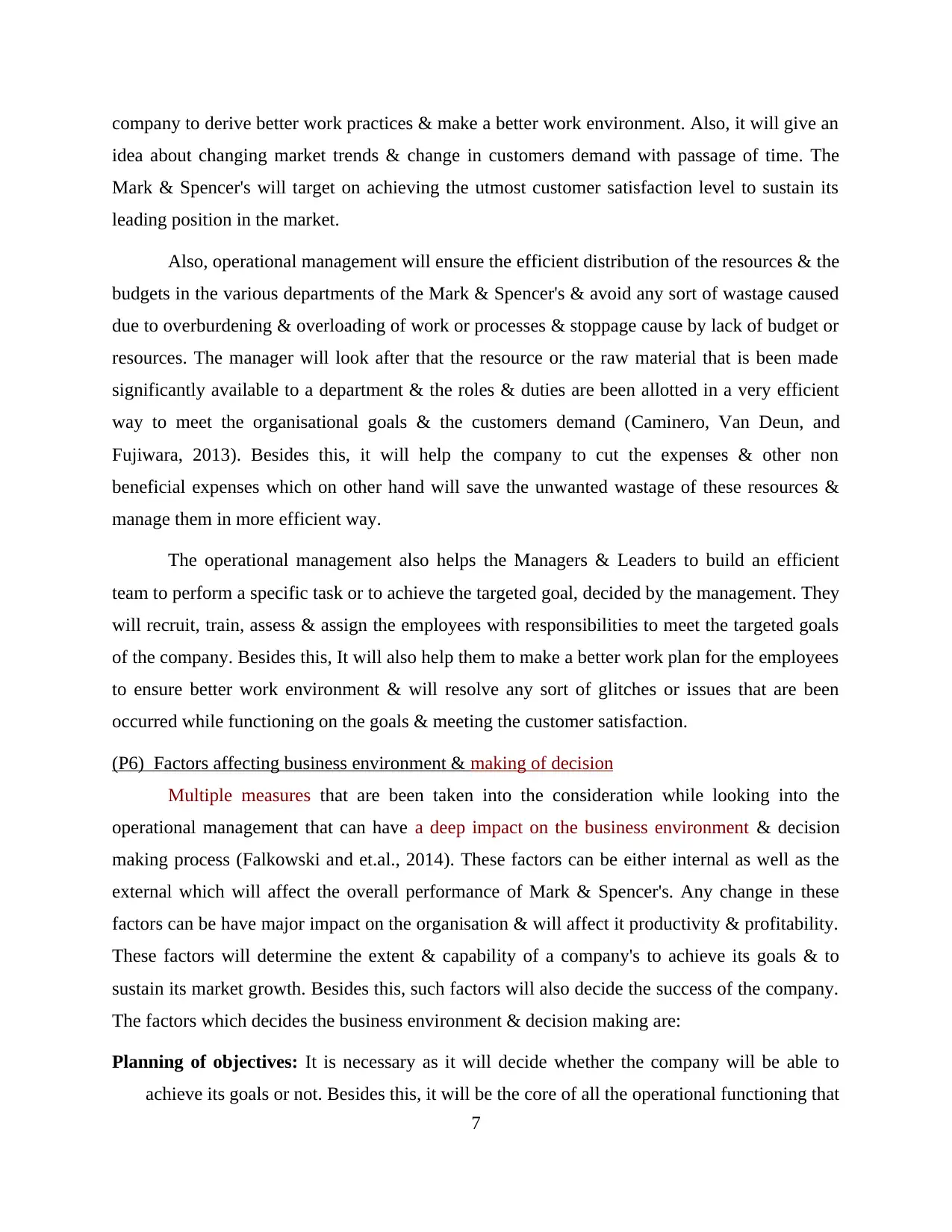
company to derive better work practices & make a better work environment. Also, it will give an
idea about changing market trends & change in customers demand with passage of time. The
Mark & Spencer's will target on achieving the utmost customer satisfaction level to sustain its
leading position in the market.
Also, operational management will ensure the efficient distribution of the resources & the
budgets in the various departments of the Mark & Spencer's & avoid any sort of wastage caused
due to overburdening & overloading of work or processes & stoppage cause by lack of budget or
resources. The manager will look after that the resource or the raw material that is been made
significantly available to a department & the roles & duties are been allotted in a very efficient
way to meet the organisational goals & the customers demand (Caminero, Van Deun, and
Fujiwara, 2013). Besides this, it will help the company to cut the expenses & other non
beneficial expenses which on other hand will save the unwanted wastage of these resources &
manage them in more efficient way.
The operational management also helps the Managers & Leaders to build an efficient
team to perform a specific task or to achieve the targeted goal, decided by the management. They
will recruit, train, assess & assign the employees with responsibilities to meet the targeted goals
of the company. Besides this, It will also help them to make a better work plan for the employees
to ensure better work environment & will resolve any sort of glitches or issues that are been
occurred while functioning on the goals & meeting the customer satisfaction.
(P6) Factors affecting business environment & making of decision
Multiple measures that are been taken into the consideration while looking into the
operational management that can have a deep impact on the business environment & decision
making process (Falkowski and et.al., 2014). These factors can be either internal as well as the
external which will affect the overall performance of Mark & Spencer's. Any change in these
factors can be have major impact on the organisation & will affect it productivity & profitability.
These factors will determine the extent & capability of a company's to achieve its goals & to
sustain its market growth. Besides this, such factors will also decide the success of the company.
The factors which decides the business environment & decision making are:
Planning of objectives: It is necessary as it will decide whether the company will be able to
achieve its goals or not. Besides this, it will be the core of all the operational functioning that
7
idea about changing market trends & change in customers demand with passage of time. The
Mark & Spencer's will target on achieving the utmost customer satisfaction level to sustain its
leading position in the market.
Also, operational management will ensure the efficient distribution of the resources & the
budgets in the various departments of the Mark & Spencer's & avoid any sort of wastage caused
due to overburdening & overloading of work or processes & stoppage cause by lack of budget or
resources. The manager will look after that the resource or the raw material that is been made
significantly available to a department & the roles & duties are been allotted in a very efficient
way to meet the organisational goals & the customers demand (Caminero, Van Deun, and
Fujiwara, 2013). Besides this, it will help the company to cut the expenses & other non
beneficial expenses which on other hand will save the unwanted wastage of these resources &
manage them in more efficient way.
The operational management also helps the Managers & Leaders to build an efficient
team to perform a specific task or to achieve the targeted goal, decided by the management. They
will recruit, train, assess & assign the employees with responsibilities to meet the targeted goals
of the company. Besides this, It will also help them to make a better work plan for the employees
to ensure better work environment & will resolve any sort of glitches or issues that are been
occurred while functioning on the goals & meeting the customer satisfaction.
(P6) Factors affecting business environment & making of decision
Multiple measures that are been taken into the consideration while looking into the
operational management that can have a deep impact on the business environment & decision
making process (Falkowski and et.al., 2014). These factors can be either internal as well as the
external which will affect the overall performance of Mark & Spencer's. Any change in these
factors can be have major impact on the organisation & will affect it productivity & profitability.
These factors will determine the extent & capability of a company's to achieve its goals & to
sustain its market growth. Besides this, such factors will also decide the success of the company.
The factors which decides the business environment & decision making are:
Planning of objectives: It is necessary as it will decide whether the company will be able to
achieve its goals or not. Besides this, it will be the core of all the operational functioning that
7
⊘ This is a preview!⊘
Do you want full access?
Subscribe today to unlock all pages.

Trusted by 1+ million students worldwide
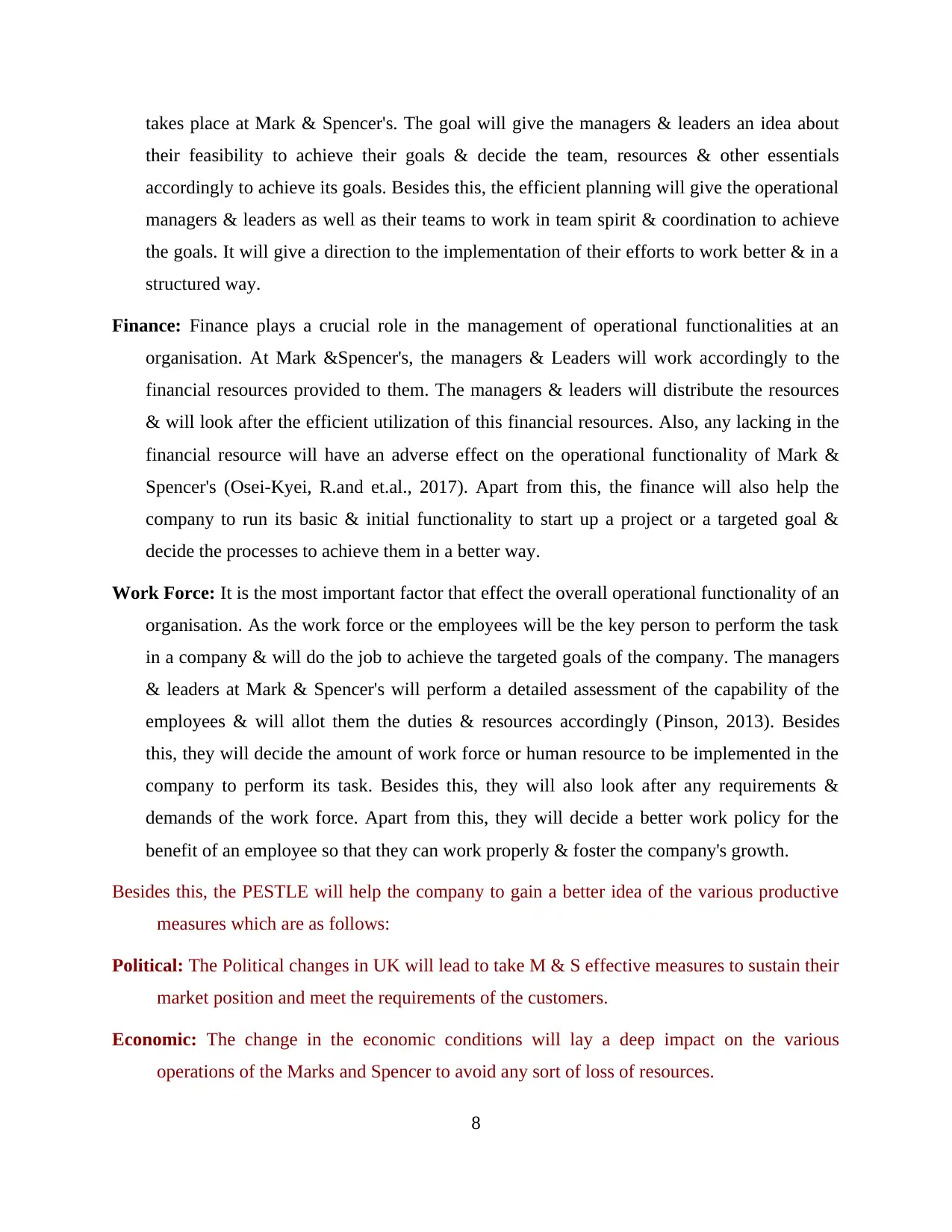
takes place at Mark & Spencer's. The goal will give the managers & leaders an idea about
their feasibility to achieve their goals & decide the team, resources & other essentials
accordingly to achieve its goals. Besides this, the efficient planning will give the operational
managers & leaders as well as their teams to work in team spirit & coordination to achieve
the goals. It will give a direction to the implementation of their efforts to work better & in a
structured way.
Finance: Finance plays a crucial role in the management of operational functionalities at an
organisation. At Mark &Spencer's, the managers & Leaders will work accordingly to the
financial resources provided to them. The managers & leaders will distribute the resources
& will look after the efficient utilization of this financial resources. Also, any lacking in the
financial resource will have an adverse effect on the operational functionality of Mark &
Spencer's (Osei-Kyei, R.and et.al., 2017). Apart from this, the finance will also help the
company to run its basic & initial functionality to start up a project or a targeted goal &
decide the processes to achieve them in a better way.
Work Force: It is the most important factor that effect the overall operational functionality of an
organisation. As the work force or the employees will be the key person to perform the task
in a company & will do the job to achieve the targeted goals of the company. The managers
& leaders at Mark & Spencer's will perform a detailed assessment of the capability of the
employees & will allot them the duties & resources accordingly (Pinson, 2013). Besides
this, they will decide the amount of work force or human resource to be implemented in the
company to perform its task. Besides this, they will also look after any requirements &
demands of the work force. Apart from this, they will decide a better work policy for the
benefit of an employee so that they can work properly & foster the company's growth.
Besides this, the PESTLE will help the company to gain a better idea of the various productive
measures which are as follows:
Political: The Political changes in UK will lead to take M & S effective measures to sustain their
market position and meet the requirements of the customers.
Economic: The change in the economic conditions will lay a deep impact on the various
operations of the Marks and Spencer to avoid any sort of loss of resources.
8
their feasibility to achieve their goals & decide the team, resources & other essentials
accordingly to achieve its goals. Besides this, the efficient planning will give the operational
managers & leaders as well as their teams to work in team spirit & coordination to achieve
the goals. It will give a direction to the implementation of their efforts to work better & in a
structured way.
Finance: Finance plays a crucial role in the management of operational functionalities at an
organisation. At Mark &Spencer's, the managers & Leaders will work accordingly to the
financial resources provided to them. The managers & leaders will distribute the resources
& will look after the efficient utilization of this financial resources. Also, any lacking in the
financial resource will have an adverse effect on the operational functionality of Mark &
Spencer's (Osei-Kyei, R.and et.al., 2017). Apart from this, the finance will also help the
company to run its basic & initial functionality to start up a project or a targeted goal &
decide the processes to achieve them in a better way.
Work Force: It is the most important factor that effect the overall operational functionality of an
organisation. As the work force or the employees will be the key person to perform the task
in a company & will do the job to achieve the targeted goals of the company. The managers
& leaders at Mark & Spencer's will perform a detailed assessment of the capability of the
employees & will allot them the duties & resources accordingly (Pinson, 2013). Besides
this, they will decide the amount of work force or human resource to be implemented in the
company to perform its task. Besides this, they will also look after any requirements &
demands of the work force. Apart from this, they will decide a better work policy for the
benefit of an employee so that they can work properly & foster the company's growth.
Besides this, the PESTLE will help the company to gain a better idea of the various productive
measures which are as follows:
Political: The Political changes in UK will lead to take M & S effective measures to sustain their
market position and meet the requirements of the customers.
Economic: The change in the economic conditions will lay a deep impact on the various
operations of the Marks and Spencer to avoid any sort of loss of resources.
8
Paraphrase This Document
Need a fresh take? Get an instant paraphrase of this document with our AI Paraphraser
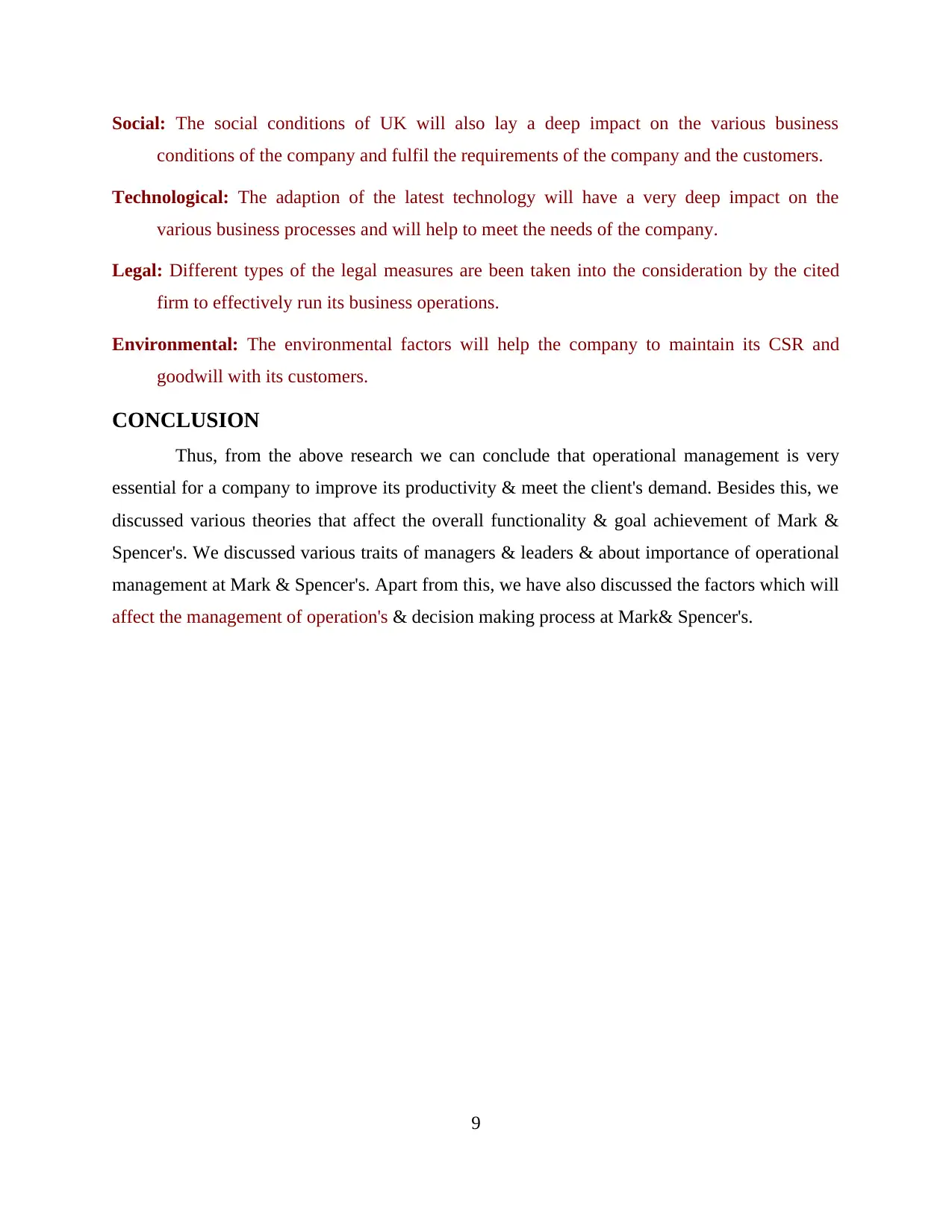
Social: The social conditions of UK will also lay a deep impact on the various business
conditions of the company and fulfil the requirements of the company and the customers.
Technological: The adaption of the latest technology will have a very deep impact on the
various business processes and will help to meet the needs of the company.
Legal: Different types of the legal measures are been taken into the consideration by the cited
firm to effectively run its business operations.
Environmental: The environmental factors will help the company to maintain its CSR and
goodwill with its customers.
CONCLUSION
Thus, from the above research we can conclude that operational management is very
essential for a company to improve its productivity & meet the client's demand. Besides this, we
discussed various theories that affect the overall functionality & goal achievement of Mark &
Spencer's. We discussed various traits of managers & leaders & about importance of operational
management at Mark & Spencer's. Apart from this, we have also discussed the factors which will
affect the management of operation's & decision making process at Mark& Spencer's.
9
conditions of the company and fulfil the requirements of the company and the customers.
Technological: The adaption of the latest technology will have a very deep impact on the
various business processes and will help to meet the needs of the company.
Legal: Different types of the legal measures are been taken into the consideration by the cited
firm to effectively run its business operations.
Environmental: The environmental factors will help the company to maintain its CSR and
goodwill with its customers.
CONCLUSION
Thus, from the above research we can conclude that operational management is very
essential for a company to improve its productivity & meet the client's demand. Besides this, we
discussed various theories that affect the overall functionality & goal achievement of Mark &
Spencer's. We discussed various traits of managers & leaders & about importance of operational
management at Mark & Spencer's. Apart from this, we have also discussed the factors which will
affect the management of operation's & decision making process at Mark& Spencer's.
9
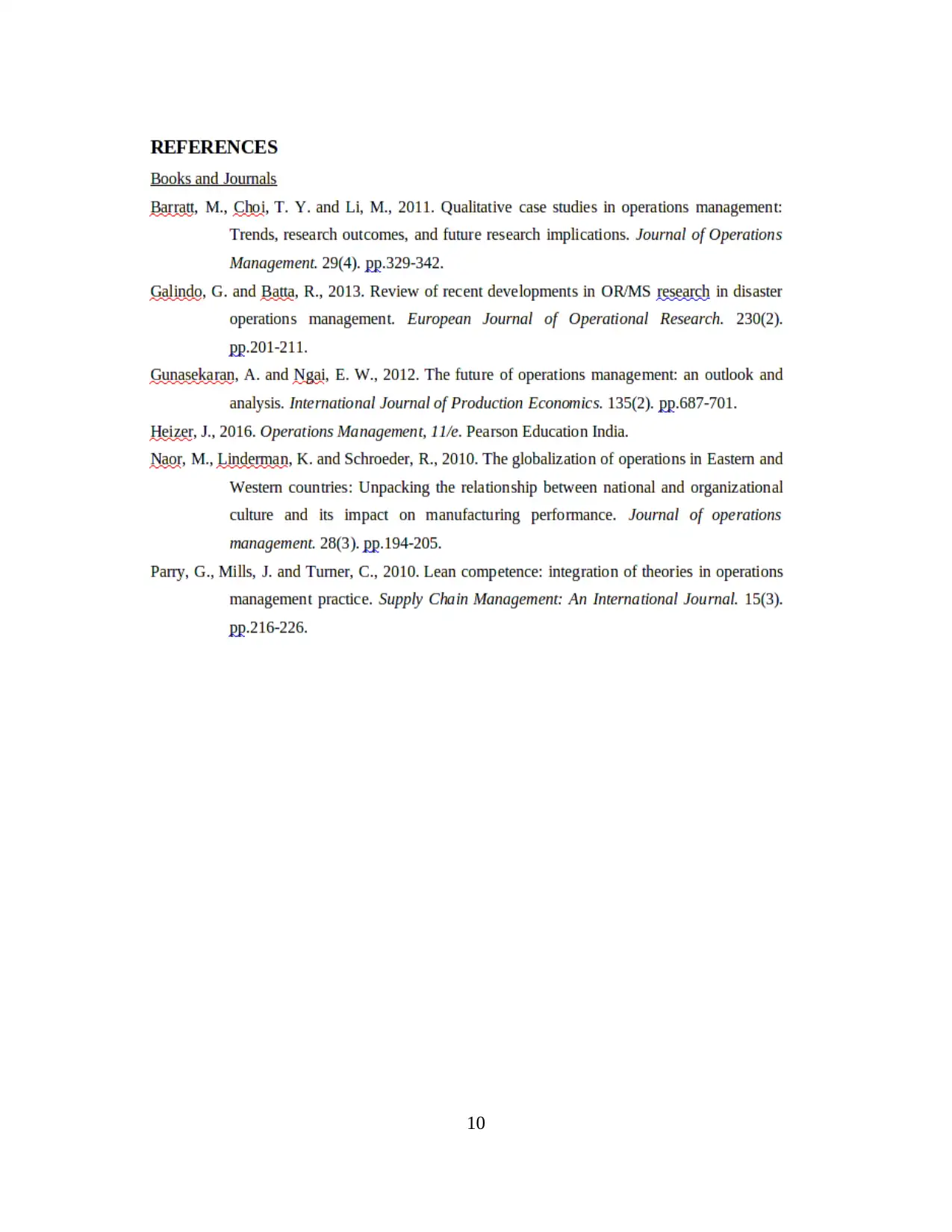
10
⊘ This is a preview!⊘
Do you want full access?
Subscribe today to unlock all pages.

Trusted by 1+ million students worldwide
1 out of 12
Related Documents
Your All-in-One AI-Powered Toolkit for Academic Success.
+13062052269
info@desklib.com
Available 24*7 on WhatsApp / Email
![[object Object]](/_next/static/media/star-bottom.7253800d.svg)
Unlock your academic potential
Copyright © 2020–2025 A2Z Services. All Rights Reserved. Developed and managed by ZUCOL.





